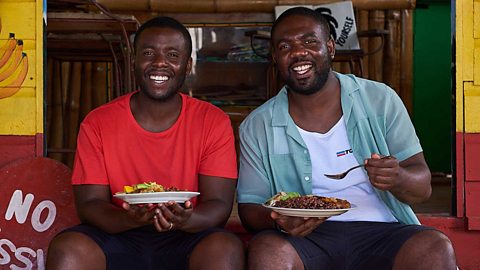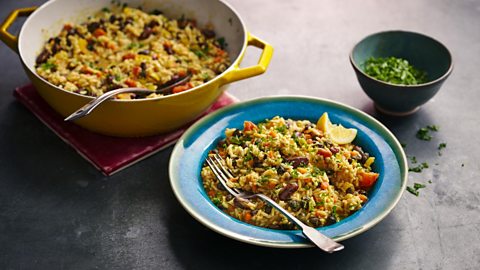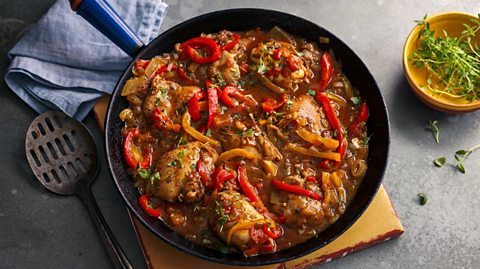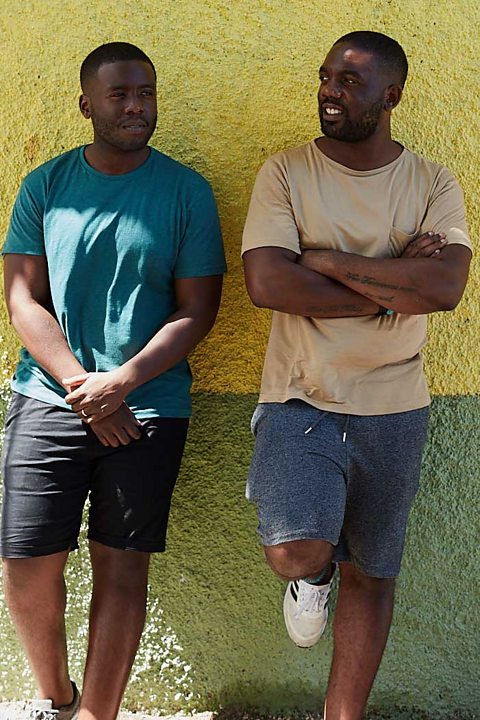5 reasons to cook Jamaican food right now

Cooking is a family affair
As the nights draw in, weÔÇÖre spending more time at home, and ÔÇťJamaican food is all about spending time with familyÔÇŁ, says Craig. ÔÇťThereÔÇÖs a history to that ÔÇô what makes the cuisine so special is how the dishes originated. Basically, the foods that were discarded [by slave owners] and given to our forefathers during slavery were forged to make delicious dishes, showing that even through real hardships, beautiful food was still created. Time to eat was often the only time they could create moments with familyÔÇŽ because it was the only time theyÔÇÖd get rest from work. Even today, family and food go hand in hand ÔÇô for example, every year we have a barbecue for my grandmotherÔÇÖs birthday.
ÔÇťMy earliest food memory is being bossed around in the kitchen by our grandmother and mother. We would get food orders from the rest of the family, go back into the kitchen and explain what people wantedÔÇŽ then serve it all up into bowls and take it out. All the jobs that people didnÔÇÖt want to do were handed down to me because IÔÇÖm the youngest!ÔÇŁ
Get ready for carbs

ÔÇťThere are five common carbs served up when youÔÇÖre having a traditional Jamaican meal: rice, potatoes, macaroni cheese, bread, and fried dumplings. With a big meal, youÔÇÖre going to probably have three of those served. ItÔÇÖs up to you to decide which ones you opt for. Choose wisely!ÔÇŁ
Jamaican cooking can be quick

ÔÇťWhen we were writing our cookbook, we spent time out in Jamaica and visited family. We wanted to cook them a big Sunday lunch, but it took a lot longer than youÔÇÖd think. We got up at 4.30am [on Saturday] to go to the Coronation Market in Kingston. We thought it would be relatively quiet, but it was already packed. We bought fresh callaloo, onions, garlic, ginger and scotch bonnets. We took it all home, seasoned our meat, and prepared our rice and peas by soaking dried kidney beans overnight in water. The following day, we started preparing food at 5am before going to church, then made sure all the cooking was ready for lunch. Including buying the produce, the whole meal took about 30 hours, but just in terms of prepping and cooking it took about 18 hours.
ÔÇťThat isnÔÇÖt typical thoughÔÇŽ we know about traditional ways of cooking, but being British born and part of a new generation, we understand people need tricks and tips that can make things much quicker.ÔÇŁ
You can mix old and new
ÔÇťMe and Shaun want to make sure traditional dishes are still used and remain current, so the new generation know about them. But we also like to fuse traditional ingredients with other cuisines. WeÔÇÖre British and have grown up in the UK. So, weÔÇÖve got recipes like jerk lentil bolognese, that is vegan and of course references bolognese, which we often had growing up.
ÔÇťThere are so many ways you can mix old with new, and one of our latest is jerk burgers. We grew up loving burgers, but weÔÇÖd sometimes be frustrated with the blandness of them. Often it was just salt and black pepper, so we added spices that we use in the marinade of jerk chicken to the mince, and itÔÇÖs delicious.ÔÇŁ
Craig and Shaun show how to make their jerk burgers in this quick video.
ItÔÇÖs made for sharing
ÔÇťOften you prepare more just in case somebody comes over, butÔÇŽ do not come with your hands empty! If I turned up without anything, my nan would say: ÔÇśYouÔÇÖve just come over with long handsÔÇÖ, which means because thereÔÇÖs nothing in my hands they appear longer than if I was carrying a dish. You should always come with a dessert or drink, or at least offer to wash up.ÔÇŁ

One thing thatÔÇÖs not so good...
ÔÇťAs a child, it was always devastating to go to the freezer, see an ice-cream tub, and take it out only to find it was filled with leftovers from the day or week before ÔÇô rice and peas or curried goat, frozen food thatÔÇÖs being saved for a rainy day. I donÔÇÖt know why they donÔÇÖt just use regular use plastic Tupperware, but itÔÇÖs always the ice-cream container. If you see a biscuit tin on a shelf and reach in, youÔÇÖll be disappointed [too] ÔÇô itÔÇÖll be needles and threads in there, not cookies!ÔÇŁ
